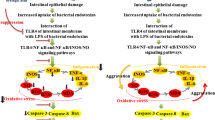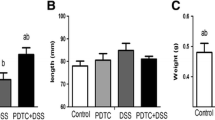Abstract
Background and aims
The expression of signal transducers and activators of transcription 3 (STAT3) is increased in Crohn’s disease (CD), and nuclear translocated STAT3 is also found in the disease. However, the role of STAT3 protein on the pathogenesis of CD is not clear. This study was executed to investigate the role of STAT3 protein on the pathogenesis of trinitrobenzene sulfonic acid (TNBS)-induced colitis, the pathogenesis of which is CD-like.
Methods
TNBS-induced colitis was produced, and STAT3 antisense oligonucleotide was administrated intracolonically during the early phase of colitis. The mice were killed 7 days later, and the expressions of STAT3 and phosphorylated STAT3 were identified by Western blot and immunofluorescence. The lamina propria mononuclear cells (LPMCs) were isolated freshly, and the percent of cell death and the expressions of Bcl-2 and Bax in LPMCs were evaluated. Colonic tissue damage and the production of inflammatory cytokines were measured also.
Results
Administration of STAT3 antisense oligonucleotide effectively inhibited STAT3 expression and phosphorylation in inflamed colonic mucosa of colitis. The mice that were administered STAT3 antisense oligonucleotide showed less colonic tissue damage with decreased production of inflammatory cytokines such as TNF-α and INF-γ in mucosa compared with that of those TNBS-induced colitis. Administration of STAT3 antisense oligonucleotide successfully induced apoptosis of LPMCs and counteracted the unbalanced expressions of Bcl-2 and Bax in LPMCs from colitis.
Conclusions
STAT3 activation may play an important role in the inflammatory process of TNBS-induced colitis, and inhibiting STAT3 activation during the early phase of the inflammatory response may have a beneficial effect on the colitis.






Similar content being viewed by others
Abbreviations
- ASON:
-
antisense oligonucleotide
- CD:
-
Crohn’s disease
- INF-γ:
-
interferon γ
- IL-6:
-
interleukin-6
- LPMCs:
-
lamina propria mononuclear cells
- MMAS:
-
mismatch antisense oligonucleotide
- MPO:
-
myeloperoxidase
- NF-κB:
-
nuclear factor-kappa B
- PMN:
-
polymorphonuclear
- pSTAT3:
-
phosphorylated STAT3
- STAT:
-
signal transducers and activators of transcription
- TNBS:
-
trinitrobenzene sulfonic acid
- TNF-α:
-
tumor necrosis factor-α
References
Oliva-Hemker M, Fiocchi C (2002) Etiopathogenesis of inflammatory bowel disease: the importance of the pediatric perspective. Inflamm Bowel Dis 8:112–128
Cheung O, Regueiro MD (2003) Inflammatory bowel disease emergencies. Gastroenterol Clin North Am 32:1269–1288
Niessner M, Volk BA (1995) Altered Th1/Th2 cytokine profiles in the intestinal mucosa of patients with inflammatory bowel disease as assessed by quantitative reversed transcribed polymerase chain reaction (RT-PCR). Clin Exp Immunol 101:428–435
Schreiber S, Nikolaus S, Hampe J (1998) Activation of nuclear factor kappa B inflammatory bowel disease. Gut 42:477–484
Thanos D, Maniatis T (1995) NF-kappa B: a lesson in family values. Cell 80:529–532
Darnell JE Jr (1997) STATs and gene regulation. Science 277:1630–1635
Schindler C, Darnell JE Jr (1995) Transcriptional responses to polypeptide ligands: the JAK-STAT pathway. Annu Rev Biochem 64:621–651
Battle TE, Frank DA (2002) The role of STATs in apoptosis. Curr Mol Med 2:381–392
Ina K, Itoh J, Kusugami K, Yamaguchi T, Kyokane K, Imada A, Binion DG, Musso A, West GA, Dobrea GM, McCormick TS, Lapetina EG, Levine AD, Ottaway CA, Fiocchi C (1999) Resistance of Crohn’s disease T cells to multiple apoptotic signals is associated with a Bcl-2/Bax mucosal imbalance. J Immunol 163:1081–1090
Ayroldi E, Zollo O, Cannarile L, D’Adamio F, Grohmann U, Delfino DV, Riccardi C (1998) Interleukin-6 (IL-6) prevents activation-induced cell death: IL-2-independent inhibition of Fas/fasL expression and cell death. Blood 92:4212–4219
Atreya R, Mudter J, Finotto S, Mullberg J, Jostock T, Wirtz S, Schutz M, Bartsch B, Holtmann M, Becker C, Strand D, Czaja J, Schlaak JF, Lehr HA, Autschbach F, Schurmann G, Nishimoto N, Yoshizaki K, Ito H, Kishimoto T, Galle PR, Rose-John S, Neurath MF (2000) Blockade of interleukin 6 trans signaling suppresses T-cell resistance against apoptosis in chronic intestinal inflammation: evidence in Crohn disease and experimental colitis in vivo. Nat Med 6:583–588
Ito H, Takazoe M, Fukuda Y, Hibi T, Kusugami K, Andoh A, Matsumoto T, Yamamura T, Azuma J, Nishimoto N, Yoshizaki K, Shimoyama T, Kishimoto T (2004) A pilot randomized trial of a human anti-interleukin-6 receptor monoclonal antibody in active Crohn’s disease. Gastroenterology 126:989–996
Mudter J, Weigmann B, Bartsch B, Kiesslich R, Strand D, Galle PR, Lehr HA, Schmidt J, Neurath MF (2005) Activation pattern of signal transducers and activators of transcription (STAT) factors in inflammatory bowel diseases. Am J Gastroenterol 100:64–72
Musso A, Dentelli P, Carlino A, Chiusa L, Repici A, Sturm A, Fiocchi C, Rizzetto M, Pegoraro L, Sategna-Guidetti C, Brizzi MF (2005) Signal transducers and activators of transcription 3 signaling pathway: an essential mediator of inflammatory bowel disease and other forms of intestinal inflammation. Inflamm Bowel Dis 11:91–98
Takeda K, Clausen BE, Kaisho T, Tsujimura T, Terada N, Forster I, Akira S (1999) Enhanced Th1 activity and development of chronic enterocolitis in mice devoid of Stat3 in macrophages and neutrophils. Immunity 10(1):39–49
Welte T, Zhang S, Wang T, Zhang Z, Hesslein DG, Yin Z, Kano A, Iwamoto Y, Li E, Craft JE, Bothwell AL, Fikrig E, Koni PA, Flavell RA, Fu XY (2003) STAT3 deletion during hematopoiesis causes Crohn’s disease-like pathogenesis and lethality: a critical role of STAT3 in innate immunity. Proc Natl Acad Sci USA 100:1879–1884
Sugimoto K, Hanai H, Tozawa K, Aoshi T, Uchijima M, Nagata T, Koide Y (2002) Curcumin prevents and ameliorates trinitrobenzene sulfonic acid-induced colitis in mice. Gastroenterology 123:1912–1922
Karras JG, McKay RA, Lu T, Pych J, Frank DA, Rothstein TL, Monia BP (2000) STAT3 regulates the growth and immunoglobulin production of BCL1 B cell lymphoma through control of cell cycle progression. Cell Immunol 202:124–135
McKay RA, Miraglia LJ, Cummins LL, Owens SR, Sasmor H, Dean NM (1999) Characterization of a potent and specific class of antisense oligonucleotide inhibitor of human protein kinase C-alpha expression. J Biol Chem 274:1715–1722
Santucci L, Fiorucci S, Rubinstein N, Mencarelli A, Palazzetti B, Federici B, Rabinovich GA, Morelli A (2003) Galectin-1 suppresses experimental colitis in mice. Gastroenterology 124:1381–1394
Wallace JL (1987) Glucocorticoid-induced gastric mucosal damage: inhibition of leukotriene, but not prostaglandin biosynthesis. Prostaglandins 34:311–323
Newberry RD, Stenson WF, Lorenz RG (1999) Cyclooxygenase-2-dependent arachidonic acid metabolites are essential modulators of the intestinal immune response to dietary antigen. Nat Med 5:900–906
Neurath MF, Pettersson S, Meyer zum Buschenfelde KH, Strober W (1996) Local administration of antisense phosphorothioate oligonucleotides to the p65 subunit of NF-kappa B abrogates established experimental colitis in mice. Nat Med 2:998–1004
Yacyshyn BR, Bowen-Yacyshyn MB, Jewell L, Tami JA, Bennett CF, Kisner DL, Shanahan WR Jr (1998) A placebo-controlled trial of ICAM-1 antisense oligonucleotide in the treatment of Crohn’s disease. Gastroenterology 114:1133–1142
Spiik AK, Ridderstad A, Axelsson LG, Midtvedt T, Bjork L, Pettersson S (2002) Abrogated lymphocyte infiltration and lowered CD14 in dextran sulfate induced colitis in mice treated with p65 antisense oligonucleotides. Int J Colorectal Dis 17:223–232
Mora LB, Buettner R, Seigne J, Diaz J, Ahmad N, Garcia R, Bowman T, Falcone R, Fairclough R, Cantor A, Muro-Cacho C, Livingston S, Karras J, Pow-Sang J, Jove R (2002) Constitutive activation of Stat3 in human prostate tumors and cell lines: direct inhibition of Stat3 signaling induces apoptosis of prostate cancer cells. Cancer Res 62:6659–6666
Takahashi T, Abe H, Arai H, Matsubara T, Nagai K, Matsuura M, Iehara N, Yokode M, Nishikawa S, Kita T, Doi T (2005) Activation of STAT3/Smad1 is a key signaling pathway for progression to glomerulosclerosis in experimental glomerulonephritis. J Biol Chem 280:7100–7106
Walker JG, Smith MD (2005) The Jak-STAT pathway in rheumatoid arthritis. J Rheumatol 32:1650–1653
O’shea JJ (2004) Targeting the Jak/STAT pathway for immunosuppression. Ann Rheum Dis 63(Suppl 2):ii67–ii71
Shouda T, Yoshida T, Hanada T, Wakioka T, Oishi M, Miyoshi K, Komiya S, Kosai K, Hanakawa Y, Hashimoto K, Nagata K, Yoshimura A (2001) Induction of the cytokine signal regulator SOCS3/CIS3 as a therapeutic strategy for treating inflammatory arthritis. J Clin Invest 108:1781–1788
Lovato P, Brender C, Agnholt J, Kelsen J, Kaltoft K, Svejgaard A, Eriksen KW, Woetmann A, Odum N (2003) Constitutive STAT3 activation in intestinal T cells from patients with Crohn’s disease. J Biol Chem 278:16777–16781
Han X, Sosnowska D, Bonkowski EL, Denson LA (2005) Growth hormone inhibits signal transducer and activator of transcription 3 activation and reduces disease activity in murine colitis. Gastroenterology 129:185–203
Kroemer G (1997) The proto-oncogene Bcl-2 and its role in regulating apoptosis. Nat Med 3:614–620
Raff MC (1992) Social controls on cell survival and cell death. Nature 356:397–400
Nielsen M, Kaestel CG, Eriksen KW, Woetmann A, Stokkedal T, Kaltoft K, Geisler C, Ropke C, Odum N (1999) Inhibition of constitutively activated Stat3 correlates with altered Bcl-2/Bax expression and induction of apoptosis in mycosis fungoides tumor cells. Leukemia 13:735–738
Shen Y, Devgan G, Darnell JE Jr, Bromberg JF (2001) Constitutively activated Stat3 protects fibroblasts from serum withdrawal and UV-induced apoptosis and antagonizes the proapoptotic effects of activated Stat1. Proc Natl Acad Sci USA 98:1543–1548
Neurath MF, Finotto S, Fuss I, Boirivant M, Galle PR, Strober W (2001) Regulation of T-cell apoptosis in inflammatory bowel disease: to die or not to die, that is the mucosal question. Trends Immunol 22:21–26
Murano M, Maemura K, Hirata I, Toshina K, Nishikawa T, Hamamoto N, Sasaki S, Saitoh O, Katsu K (2000) Therapeutic effect of intracolonically administered nuclear factor kappa B (p65) antisense oligonucleotide on mouse dextran sulphate sodium (DSS)-induced colitis. Clin Exp Immunol 120:51–58
Niemand C, Nimmesgern A, Haan S, Fischer P, Schaper F, Rossaint R, Heinrich PC, Muller-Newen G (2003) Activation of STAT3 by IL-6 and IL-10 in primary human macrophages is differentially modulated by suppressor of cytokine signaling 3. J Immunol 170:3263–3272
Dieleman LA, Elson CO, Tennyson GS, Beagley KW (1996) Kinetics of cytokine expression during healing of acute colitis in mice. Am J Physiol 271:G130–G136
Author information
Authors and Affiliations
Corresponding author
Rights and permissions
About this article
Cite this article
Bai, A., Hu, P., Chen, J. et al. Blockade of STAT3 by antisense oligonucleotide in TNBS-induced murine colitis. Int J Colorectal Dis 22, 625–635 (2007). https://doi.org/10.1007/s00384-006-0229-z
Accepted:
Published:
Issue Date:
DOI: https://doi.org/10.1007/s00384-006-0229-z




